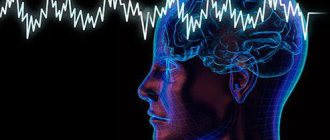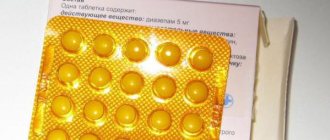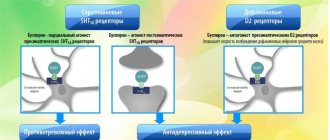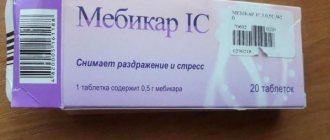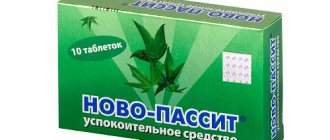Prohibited during pregnancy
Has restrictions when breastfeeding
Has restrictions for children
Can be taken by older people
Has limitations for liver problems
Has limitations for kidney problems
Lerivon is a medicine intended for the treatment of depressive conditions and some mental disorders of various etiologies. Treatment using the drug in most cases allows achieving positive results, however, in some cases, therapy using this medication is contraindicated and can lead to negative reactions of the body, therefore it is absolutely not suitable for self-medication. In particular, Lerivon, according to the instructions for use, is not recommended for impaired renal and liver function, as well as during pregnancy and pregnancy.
General information about the drug Lerivon
Lerivon is a medication from the group of tricyclic antidepressants that has an active effect on the nervous system. Available in pharmacies only by prescription.
Drug group, INN, scope of application
The Latin name of the drug is Lerivon, the international nonproprietary name (INN) is Mianserin. The medicine is part of a group of medications with antidepressant effects (tetracyclic antidepressant of the piperazine-azepine series).
Used to treat:
- bipolar affective disorders;
- depressive episodes;
- recurrent depressive disorders;
- mixed anxiety and depression.
It has a sedative and anxiolytic effect on the patient.
Release forms and average cost
Lerivon in the form of oval convex white tablets is produced by the Dutch pharmaceutical company Organon (each original tablet has the name of the manufacturer).
The cost of the drug Lerivon (30 mg) in various pharmacies in the Russian Federation:
| Number of tablets per package, pieces | Price in rubles | Pharmacy, city |
| 20 | 974 | "Be Healthy", Moscow |
| 20 | 990 | "Planet Health", Ufa |
| 20 | 1001 | "Neoapteka", St. Petersburg |
| 20 | 1098 | "Violet", Tomsk |
| 20 | 1100 | "Zdrav-City", Novosibirsk |
| 20 | 1110 | Samson Pharma, Krasnoyarsk |
| 20 | 1145 | "Zhivinka", Rostov-on-Don |
| 20 | 1295 | "Nova Vita", Samara |
| 20 | 1715 | "Rigla", Nizhny Novgorod |
Compound
The active substance of the drug is mianserin hydrochloride, which represents a group of piperazine-azepine compounds. Each tablet contains 30 mg of active ingredient.
Auxiliary components:
- magnesium stearate;
- anhydrous colloidal silicon dioxide;
- methylcellulose;
- potato starch;
- calcium hydrogen phosphate;
- food coloring E 171 (titanium dioxide);
- macrogol;
- hypromellose.
Pharmacodynamics and pharmacokinetics
The mechanism of action of the drug is determined by its main component – mianserin. This compound, entering the bloodstream, increases noradrenergic activity of the brain. The sedative effect of the drug is achieved by influencing the activity of histamine H1 receptors and alpha-1 adrenergic receptors. For patients with depression and anxiety disorders accompanied by sleep disorders, the tablets have an anxiolytic effect.
Action of mianserin
Absorption of mianserin occurs quite quickly: the drug reaches its maximum concentration in the bloodstream 3 hours after taking the tablets, and on the 7th day of therapy it creates a stable level. The half-life of the active substance is determined by the individual characteristics of the body and ranges from 21 to 61 hours. Thus, you can take the tablets once a day. Lerivon's metabolites are completely eliminated from the body after 7-9 days. The breakdown products of mianserin are excreted in urine and feces.
See also:
Pyrazidol - instructions for use, reviews from psychiatrists and analogues
Pharmacokinetics
After oral administration, it is well absorbed from the gastrointestinal tract. Cmax is reached within 2-4 hours and ranges from 6 to 12 ng/ml after oral administration of a single dose of 15 mg. Bioavailability is about 20%, which is associated with intensive metabolism during the “first pass” through the liver. With a course of use, Css is achieved after 6 days.
Plasma protein binding is 96%. Has a large Vd.
Metabolized in the liver by demethylation and oxidation, followed by conjugation of metabolites. When used in average therapeutic doses, it does not cause the phenomenon of induction of liver enzymes.
T1/2 averages 32 hours. It is excreted mainly in urine and partially in bile.
Indications and contraindications for taking Lerivon
Lerivon tablets are prescribed to patients suffering from depression, which is caused by various factors, including for the treatment of endogenous, reactive and involutional disorders. The drug has proven its effectiveness, but in order to avoid unwanted side symptoms, it is important to follow the rules of administration specified in the instructions.
Are common
Patients who have a history of:
- severe liver dysfunction;
- mania;
- high sensitivity to the composition of the drug.
Also, an absolute contraindication to taking pills is childhood, since in such patients suicidal tendencies may worsen during treatment. If the doctor nevertheless decides to prescribe Lerivon to a person under 18 years of age, the patient must remain under the supervision of a specialist throughout the entire therapy.
The list of relative contraindications to taking the medication includes:
- kidney dysfunction;
- diabetes;
- chronic heart or kidney failure;
- angle-closure glaucoma;
- prostatic hypertrophy.
The medication can have a negative effect on psychomotor function, so during therapy it is necessary to refrain from driving vehicles or operating complex machinery.
Lerivon during pregnancy and breastfeeding
The official instructions do not advise taking Lerivon during pregnancy, as well as during breastfeeding. The possibility of taking tablets by pregnant or nursing mothers should be determined individually, taking into account the potential risks and the expected positive effect.
See also:
Indications for use of the drug Telmista and its instructions
When the drug is not recommended to be taken
You should not take the drug if you have the following conditions:
- if there is mania;
- with chronic liver failure with pronounced severity;
- hypersensitivity to the constituent components;
- allergic reactions during use;
- in acute myocardial infarction;
- during angle-closure glaucoma;
- diabetes;
- children and adolescents under 18 years of age;
- during pregnancy.
Instructions for use of Lerivon
Lerivon tablets are taken orally, without chewing, with plenty of water. The daily dose is determined by the attending physician, based on the characteristics of the patient's condition. The initial dosage of the medication is 1 tablet per day, which corresponds to 30 mg of the active substance. If the expected effect is absent, the dose is gradually increased to 2-3 tablets per day (60-90 mg mianserin). But if the drug is intended for an elderly patient, it is not recommended to increase the recommended dosage.
Since the drug acts on the body as a sedative, it is better to take it before bed. If the dosage is more than 1 tablet, it can be divided into several doses.
The effectiveness of therapy is indicated if, after 2-4 weeks, positive changes are noticeable in the patient’s condition. If this does not happen, the daily dosage is increased. If even after this the expected result is not achieved within 2-4 weeks, the drug should be replaced.
On average, the duration of therapy with mianserin drugs lasts 4-6 months from the period of positive changes in the clinical picture.
Lerivon should not be taken simultaneously with the following substances:
- monoamine oxidase inhibitors (Melipramine) during treatment and for another 2 weeks after completion of the course;
- Warfarin;
- antihypertensive drugs;
- Ethanol.
See also:
Fevarin - instructions for use, reviews from patients who took the drug and psychiatrists
Drug interactions
Lerivon should not be prescribed simultaneously with monoamine oxidase inhibitors and within 14 days after their discontinuation.
Although mianserin hydrochloride does not interact with propranolol, clonidine, betanidine, methyldopa, guanethidine (including in combination with hydralazine), if it is necessary to combine Lerivon with antihypertensive drugs, it is recommended to monitor blood pressure.
Mianserin hydrochloride may interfere with the metabolism of coumarin derivatives (including warfarin), so control is necessary.
Lerivon enhances the inhibitory effect of ethanol on the central nervous system.
Possible side effects and overdose of Lerivon
One of the advantages of the drug is that it is well tolerated by elderly patients. If the dosage rules are followed, the medicine has almost no effect on the cardiosystem, and in case of an overdose, Lerivon, in comparison with tricyclic antidepressants, has a less pronounced cardiotoxic effect.
Lerivon is not an antagonist of sympathomimetics or antihypertensive drugs. However, some patients may experience some adverse reactions during therapy with these tablets.
Quite often, patients suffering from depression experience the following symptoms:
- violation of accommodation;
- constipation;
- constant feeling of dry mouth.
However, in many cases, these symptoms can be caused either by the disease itself or by the medicine. Lerivon can also sometimes cause side effects such as:
- weight gain;
- strong sedative effect (most often at the initial stage of treatment);
- lowering blood pressure;
- excessive activity of liver enzymes;
- swelling;
- exanthema;
- arthralgia.
Quite rarely, the following symptoms may appear during therapy:
- agranulocytosis or granulocytopenia;
- hypomania;
Hypomania
- hyperkinesis;
- convulsions;
- neuroleptic malignant syndrome;
- bradycardia (usually occurs after the first dose);
- jaundice.
After abrupt interruption of treatment, some patients may experience withdrawal syndrome.
The most common symptom of a drug overdose is increased sedative effects. In some cases, cardiac arrhythmia, severe hypotension, convulsions, or respiratory depression may occur. In case of overdose, rinse the stomach and apply symptomatic treatment. There is no specific antidote.
See also:
Stimuloton - instructions for use, reviews and analogues of the drug
Lerivon's analogues
Lerivon is not always available in pharmacies. If for some reason this medicine is not available to the patient, its analogues can be used.
Is it possible to replace Duloxetine?
To understand whether it is possible to replace Lerivon with Duloxetine, it is necessary to determine the principle of its action. Despite its distinctive chemical composition (the active component is duloxetine hydrochloride), Duloxetine is also used to treat depression. Meanwhile, this analogue in the form of capsules may not be suitable for many patients, including those with liver disease, kidney disease, disorders of the cardiovascular system, as well as children, pregnant women and nursing mothers.
Duloxetine can also cause a number of side effects:
- headache;
- drowsiness;
- tremor;
- dizziness;
- sleep disturbance.
But more serious consequences of therapy are also possible, such as:
- suicidal thoughts;
- hallucinations;
- bleeding in the gastrointestinal tract;
- jaundice;
- visual impairment;
- tachycardia and others.
Instructions for the drug
In case of an overdose, signs typical of poisoning appear. Undesirable consequences, as a rule, arise as a result of improper administration of the drug. If you follow the instructions and advice of the doctor, this replacement gives quite adequate results. The price of a package of Duloxetine of 28 capsules of 60 mg of active substance is 1602-3759 rubles, 14 capsules of 30 mg is 823-1110 rubles.
Other
Today, in Russian pharmacies it is not possible to buy an absolute synonym for the drug Lerivon. Although there are at least two medicines based on mianserin on the international market:
- Mianserin (India, Jenome Biotech Pvt. Ltd.);
- Miaser (Switzerland, Rivopharm SA).
Drugs with similar effects, but with a different chemical composition, are available on the domestic pharmaceutical market:
- Velaxin (Hungary). An antidepressant used to treat depressive episodes, mixed anxiety and depressive disorders, and recurrent depressive disorders. The main component is venlafaxine hydrochloride (
Compound
According to the instructions for Lerivon, the active substance is mianserin hydrochloride; one tablet contains thirty milligrams of the active ingredient. Auxiliary microelements are:
- magnesium salt and stearic acid;
- silicon dioxide;
- cellulose ether and methanol;
- starch;
- disubstituted calcium phosphate;
- titanium white;
- ethylene glycol polymer;
- hypromellose.
Reviews about the application
Having studied the instructions for use of Lerivon tablets, it becomes clear that, in addition to the beneficial effect on the patient, the drug also has a number of side properties. Reviews of patients taking this medication, as well as the opinion of doctors who use mianserin-based products in their practice, will help to finally determine whether this medicine is suitable for the patient.
Doctors' opinion
Khudyakov A.K., psychiatrist: “I have already been convinced more than once that this drug is very effective when it comes to treating depression, as well as headaches that appear after traumatic brain injuries. Most of my patients tolerate the medication well, although many experience increased appetite and swelling during therapy. In addition, many people develop tolerance to the drug quite quickly, so I do not prescribe it for longer than 4 weeks. To avoid addiction, after a month I prescribe an analogue to the patient.”
Lapin I.S., psychiatrist: “My opinion about Lerivon is ambiguous. The drug perfectly eliminates signs of depression and anxiety, improves sleep, the first positive changes can be observed already on the third day of therapy. But at the same time, most patients complain of side effects after a month of treatment. Most often this is an indomitable appetite, dry mouth and decreased blood pressure. Moreover, due to its high cost, not all patients can afford this medicine, so analogues often have to be prescribed.”
"Neuroplant"
It is a herbal medicine with an antidepressant effect. Neuroplant is sold from pharmacies in the form of tablets for oral administration. The capsules have a biconvex shape and are brown in color. The tablets are packaged in blisters of twenty pieces. In total, the package contains from one to three blisters.
The main active ingredient is the dry extract of St. John's wort, which has antidepressant, anxiolytic and sedative effects.
The active microelement has a positive effect on the functioning of the central nervous system. It is believed that the drug is capable of inhibiting the activity of monoamine oxidase.
The calming effect is associated with the combination of bioflavonoids with benzodiazepine nerve endings, as well as the ability to suppress the effects of adrenaline, serotonin and dopamine.
Neuroplant stabilizes emotions, improves mood, sleep, and also helps improve physical and mental performance.
Indications for taking the drug "Neuroplant" are depressive states of moderate and mild severity, accompanied by the following negative signs:
- apathy;
- depressed mood;
- decreased performance.
The cost of Neuroplant is 400 rubles.

